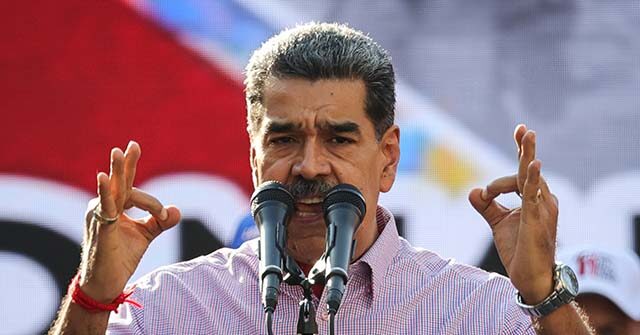Venezuela’s socialist regime is distributing a bonus stipend worth about $4 to celebrate this year’s Holy Week, local outlets reported Thursday.
Since 2017, the Maduro regime has distributed “generous” Fatherland Bonus stipends at its own discretion to bearers of a “Fatherland Card.” The stipends, which rarely total an amount that can materially help Venezuela’s impoverished citizens, are often themed to a national holiday and accompanied with messages from dictator Nicolás Maduro sent via text messaging to the recipients’ phones.
Distribution of the “bonuses” is handled by the socialist regime’s Fatherland system, an extensive social control platform that the Venezuelan socialists deployed in 2017 with the aid of China’s ZTE company that is largely inspired by the Chinese Communist Regime’s social credit system.
According to local media, the first beneficiaries of the “Holy Week 2025 bonus” began receiving a stipend of 350 Venezuelan bolivars (roughly $4) on Wednesday and its distribution will run through Tuesday, April 22.
“Let us renew during Holy Week the values of love, peace and justice; let us enjoy with conscience our beloved Venezuela,” Maduro’s accompanying message reportedly read.
The Venezuelan outlet El Pitazo pointed out that the regime’s Holy Week monetary stipend is barely sufficient to buy a kilogram of fish to eat on Good Friday, the day when Catholics commemorate the crucifixion and death of Jesus Christ. Catholics traditionally abstain from eating meat, opting for fish, on Good Friday.
This week, El Pitazo reported that a kilogram of fish in Venezuela’s main cities ranges in price from $3 and $21, depending on the type and location. Venezuela’s monthly public sector minimum wage is 130 bolivars, or roughly $1.60, excluding Fatherland monetary stipends and “Economic War” bonuses, which bring the total public sector wages to roughly $100-130.
“A kilo of fish is about seven dollars, more than my pension. One helps oneself with the bonuses and I have to stretch it to eat for a month and buy some medicines,” Nolli Fernández, a retired Venezuelan teacher, told El Pitazo. “Now one has to think well how to make do with what little one has. And if I can’t, I’ll buy chicken for Good Friday or I’ll eat salad.”
The Fatherland system recommends on its website that, before cashing in the Holy Week bonus, its recipients should “evaluate” using the money for the payment of state-owned public utilities or phone bills, pay for the system’s monthly subsidized fuel rations, or pay for SimpleTV, the local cable operator that took over the operations of American company DirecTV after it left Venezuela in 2020.
In March, the Venezuelan Finances Observatory (OVF), a non-government organization, released a study finding that, during 2024, 86 percent of Venezuelans lived in conditions of poverty. Their respective households earned less than $391, an amount equivalent to the average basic family food expenses in the country as of December.
The study also found that 24 percent of Venezuelan households receive remittances from abroad, 50 percent of which originate from sons or stepsons of the respondents. OVF measured March’s inflation rate in Venezuela at 13.1 percent, for an accumulated 37.7 percent across the first three months of 2025.
Christian K. Caruzo is a Venezuelan writer and documents life under socialism. You can follow him on Twitter here.
Read the full article here


